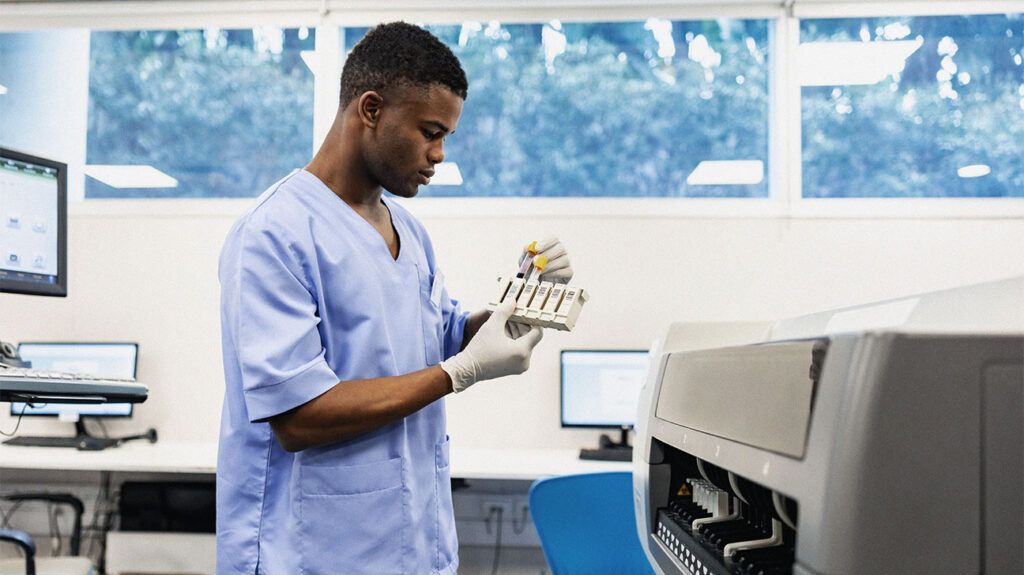Blood tests can help show abnormalities in the blood that may indicate colon cancer, such as tumor markers or low levels of red blood cells. Doctors typically carry out other tests alongside blood tests to check for colon cancer, such as stool tests and a colonoscopy.
Blood tests can also help doctors monitor colon cancer, find out how well treatment is working, and check whether cancer returns after treatment.
This article explains how doctors use blood tests to diagnose colon cancer.
A note about sex and gender
Sex and gender exist on spectrums. This article will use the terms “male,” “female,” or both to refer to sex assigned at birth. Click here to learn more.

A complete blood count (CBC) measures levels of cells in the blood, including red blood cells.
Results
Hemoglobin is a protein in red blood cells that helps transport oxygen. The American Society of Hematology states that a doctor will diagnose anemia if the hemoglobin level is less than 13.5 grams per deciliter (g/dL) for an adult male and less than 12 g/dL for an adult female.
Typical ranges may vary for each person, depending on factors such as a person’s age, sex, and the laboratory that processes the sample.
Doctors may also recommend liver enzyme tests, which are blood tests to show how well the liver functions. Testing liver function can indicate whether cancer has spread to the liver.
Results
Typical liver function ranges can vary between laboratories and different people, depending on gender and body mass index (BMI). However, doctors may use the
| Enzyme | Typical range |
|---|---|
| alanine transaminase | 4–36 international units per liter (IU/L) |
| aspartate transaminase | 5–30 IU/L |
| alkaline phosphatase | 30–120 IU/L |
| gamma-glutamyl transferase | 6–50 IU/L |
| bilirubin | 2–17 micromoles per liter |
| albumin | 35–50 g/L |
Certain substances in the blood, known as tumor markers, can indicate colon cancer. Colorectal cancer can produce carcinoembryonic antigen (CEA), a protein which, at a higher level,
Tumor marker blood tests are not effective on their own for diagnosing colorectal cancer. People may have abnormal tumor marker test results due to another cause. Similarly, some people who have cancer may receive results suggesting that they do not.
Doctors may recommend tumor marker tests alongside other diagnostic tests or to help monitor treatment for colon cancer.
Results
A higher level of CEA may indicate colorectal cancer. However, factors other than cancer can also cause elevated CEA, such as smoking.
A CEA level
A CEA level higher than 10 µg/L may suggest a higher risk of recurrence.
People will need to follow the advice of a doctor to prepare for any blood tests. Some tests may not require any preparation, while others may require a period of fasting (not eating or drinking) before the test.
Unless a doctor instructs otherwise, people must continue taking any medications as they typically would.
If the test only requires a small amount of blood, a healthcare professional, such as a nurse or phlebotomist, may prick a person’s finger to collect a blood sample for testing under a microscope. For larger amounts of blood, they will insert a needle into a vein, typically in the arm.
Before taking a sample, a healthcare professional will clean the skin area with an antiseptic wipe and apply a blood pressure cuff to the arm to increase blood flow to the vein.
They will withdraw the required amount of blood and send it in a test tube to the laboratory for testing.
People may feel a slight scratch or pinprick when a healthcare professional withdraws blood, but it is not very painful.
Some people may feel slightly faint or dizzy after having a blood test. If recommended by a healthcare professional, people may find it helpful to drink water before a blood test to help prevent feeling faint.
People may experience some light bruising or swelling around the area after a blood test, but this will likely subside within a few days.
Any bleeding following a blood test will usually stop quickly but may take slightly longer for people taking a blood-thinning medication.
After the results of a blood test analysis come back, a doctor will explain what the results mean.
If a blood test returns abnormal results, a doctor may recommend further testing,
In the United States, the Affordable Care Act
However, people may have to pay for the blood tests, as these may count as diagnostic tests rather than screening tests.
There are organizations that offer financial help to cover colorectal cancer screening costs, such as Facing Hereditary Cancer Empowered and Colorectal Cancer Alliance.
Blood tests can help doctors diagnose colon cancer by detecting abnormalities, such as low red blood cell counts or tumor markers. A doctor may order a CBC, liver enzyme tests, and tumor marker tests.
However, blood tests alone cannot diagnose colon cancer. If a blood test returns abnormal results, a doctor will order other tests, such as stool tests or a colonoscopy.
